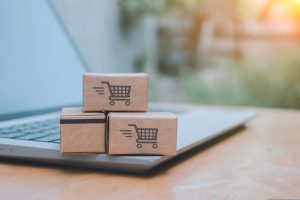E-commerce Fulfillment: Definition, Process & Selection
Do you feel like your customers conspire to leave you a shipload of negative reviews after receiving a late, lost, or damaged package? Are you an eCommerce business owner who is tired of having to deal with abandoned shopping carts? If you’re looking for a way to improve your customers’ experience and increase sales, quality e-commerce fulfillment is the answer.
What is E-commerce Fulfillment?
E-commerce fulfillment is an all-inclusive service that covers everything from receiving stock, storage, order processing, and delivery of goods. Fulfillment allows eCommerce business owners to outsource their order fulfillment process, which involves managing inventory, orders, and shipments. This frees up time and resources so they can focus on more important aspects of running an eCommerce store, like marketing and customer service.
What is The E-commerce Fulfillment Process?
The e-commerce fulfillment process goes beyond picking and packing orders. It should make your e-commerce business flow like a well-oiled machine. The process starts with sales orders coming in from your website or marketplace. Incoming orders are then sent to the warehouse, where they are carefully picked and packed for shipping. Once ready, the packages are shipped out to customers around the world via a delivery partner.
When you outsource your eCommerce fulfillment, your online business will benefit from access to advanced inventory tracking technology, state-of-the-art warehousing and shipping systems, and skilled warehouse personnel. All these factors combined ensure that orders are fulfilled quickly and accurately, so customers receive their purchases in a timely manner. It also reduces expenses and risks and gives you access to a flexible warehouse space.
The four basic components of the eCommerce fulfillment process are:
1. E-commerce store and fulfillment center integration
2. Receiving and inventory management
3. Order fulfillment
4. Returns processing
Read on to explore each of the above components in detail and learn more about the eCommerce fulfillment process and how it can turn your online business fortunes around.
SFI is a third-party logistics provider that offers complete e fulfilment services for businesses of all sizes. Our flexible, cost-effective, and reliable services are tailored to meet the unique needs of each customer we serve. Contact us today to experience the SFI difference!
Our team of specialists is happy to answer any questions you may have about online fulfillment or electronic fulfillment and help you choose the right options for your business. We look forward to hearing from you!
How Ecommerce Fulfilment Works
If you need help managing your outsourced eCommerce store’s order fulfillment operation, it may be time to learn the stages of the retail fulfillment process. This can significantly reduce the time and resources your business devotes to managing and shipping orders.
Omni Channel Fulfillment Center Integration
Technology should be your eCommerce business’s best friend when it comes to ordering fulfillment. The first step is integrating your store with the retail fulfilment warehouse, allowing for seamless communication between the two entities. This will ensure that orders get processed quickly and accurately.
A solid e fullfilment center should have these characteristics:
- To make sure you get the most out of your online fulfillment center, hunt for one that maximizes uptime and provides reliable customer support to swiftly address any potential issues.
- For optimal efficiency, your 3PL company should sync with each of your sales channels. If there are any platforms that aren’t already integrated, then a custom app should be developed to facilitate connection for incoming orders.
- Don’t overlook the importance of a strong IT team; it’s just as critical to your success as those packing and shipping orders. Ensure that your fulfillment provider has an experienced and competent IT department.
Receiving And Inventory Management
This is where several fullfiment warehouses fail to deliver. With a reliable 3PL partner, your inventory will be tracked and monitored accurately as it arrives and leaves the warehouse. This helps maintain accurate stock levels, reducing backorders and ensuring that customers receive their purchases in a timely manner.
If pallets are not put away quickly and efficiently, you may end up with a disorganized ecommerce fulfillment warehouse, causing delays in order fulfillment. Your 3PL provider should be able to create an organized storage system that easily allows for quick access and processing of orders.
Your ecommerce order fulfilment provider should have at least three basic characteristics:
- For seamless inventory management, your eCommerce fulfillment operation center should promptly place products into storage within 48 hours of receiving them.
- When you choose a 3PL provider, it’s essential that they have a low shrinkage allowance. Some fulfillment centers prioritize inventory control and therefore cover products lost or broken while in their possession. This means that you won’t need to factor your expected shrinkage into the amount of stock required when making calculations – great news!
- Logging into your inventory management system is a must; this real-time data helps you maintain the perfect balance of stock levels. Too much capital tied up in inventory? Not ideal. Running out before restocking and losing sales? Even worse! With accurate tracking, you can find that sweet spot between these two extremes and maximize profits for your business.
Order Fulfillment eCommerce
This is the stage where your products are carefully picked, packed, and shipped out to your customers. Depending on the size and complexity of your orders, different fufillment centers will use various techniques to streamline this process. For example, automated picking is a popular option for companies that sell multiple-product orders as it allows them to swiftly pick up each product from its designated location in the warehouse.
Now let’s discuss three ways your online fullfillment center can support you in providing fast and inexpensive shipping to meet customer expectations:
- Select a fulfillment center that is well-situated to ensure your customers receive their orders within two days or less. This approach will allow you to adequately serve most of your customer base without any delays.
- When searching for a 3PL provider, seek out one that offers expedited shipping with next-day or even same-day turnaround.
- Request information to gain insight into the error rates of the fullfillment business center.
Returns Processing
This is inevitable and is also known as reverse logistics. Your 3PL should help you manage returns in an efficient and cost-effective way, while also providing a smooth customer experience. A good reverse logistics system allows customers to easily process their returns with minimal effort – ensuring that they get their refund and are satisfied with the whole shopping journey. It’s crucial that your 3PL partner can process returns quickly and accurately, while also allowing you to capture and analyze data in order to optimize your product performance.
To make the return process effortless for yourself and your customers, here are three ways an eCommerce fufilment partner can step in:
- Free yourself from the hassle of customer service regarding returns and allow your 3PL provider to handle it, so you can focus on expanding your sales!
- To address issues with damaged goods, create a system for handling returns. Then, think about launching an additional website to sell the returned items at cut-rate prices. Ensure that your e-fulfillment provider can review and process orders for discounted products as well.
- Securing a warehouse that can ensure returns are restocked within one to two days will drastically improve the profitability of your business and bolster customer trust. Long-term storage on receiving docks is detrimental, so act quickly to find an appropriate solution!
Section 321 Duty Free Shipping
Section 321 is a legal framework that allows for duty-free admission of goods into the United States, with items valued up to $800. This limit used to be set at only $200 prior to 2016; however, now it has increased significantly – making it an even better value!
This is fabulous news for both eCommerce shoppers and sellers alike! Purchasing items worth $800 or less from international countries won’t require import duties, making it much easier to shop online. This is a huge advantage that simplifies the logistics of international shopping.
Customs Brokerage
Customs brokerage refers to the process of obtaining permission to move goods into or out of a country. This includes preparing and submitting paperwork, liaising with government authorities, and ensuring that all regulations are followed.
What is Drop Shipping?
Drop shipping is an e commerce order fulfillment model where the retailer (you!) does not need to keep products in stock. Instead, when a customer places an order with your business, you will forward those details to your supplier who will then ship the product directly to the customer on your behalf. This eliminates the need for warehousing and managing inventory which ultimately reduces your overhead cost.
What Are The Differences Between 3PL And Drop Shipping?
Traditional e fulfillment is different from drop shipping in that with the former, you need to manage inventory and stock, whereas in the latter all of this is managed by your supplier. 3PL providers usually have a wide variety of services such as warehousing and order fulfillment, while drop shippers are strictly limited to providing product shipment only. Additionally, 3PL providers can often accommodate eCommerce businesses of any size, whereas drop shipping is more suited for small to medium-sized retailers.
What is Third-Party Fulfillment Service All About?
3PL, eCommerce fulfillment, and order fulfillment all refer to the traditional method of fulfillment. This is where a business outsources its inventory management to a third-party provider. This can help reduce overhead costs, increase operational efficiency and enable faster delivery times for customers. It also eliminates the need for companies to manage their own warehouses and staff, allowing them to focus on core activities such as marketing, product development, sales, and customer service.
But how does E-commerce logistics fulfilment work?
- You manufacture or acquire items to sell on the internet.
- Prior to making your products available online, you must invest in inventory upfront.
- You send your inventory to a reliable third-party fulfillment service.
- As soon as a customer purchases from you, your eCommerce distribution center collects the order from your existing inventory and sends it directly to them. With this efficient system in place, customers can expect their items quickly and easily!
- Every penny from your order goes directly into your business.
- Your profit is calculated by subtracting your wholesale costs, overhead expenses, and other associated fees from the sale price.
Should You Outsource Your E-Commerce Fulfillment?
As your business grows, so too will your logistical requirements. To keep up with customer demand and ensure that orders are fulfilled on time, it might be beneficial to outsource your eCommerce order fulfillment services. This can save you money in the long term and help you optimize your product performance.
Here are selected advantages of outsourcing your Ecommerce fulfillment services:
- Escape the burden of a costly, long-term e commerce fulfillment warehouse
lease and experience the freedom that comes with not being tied down to a space you may not actually need.
- Expert professionals who are skilled in offline and online order fulfilment will expertly hand-pick and package your orders with the utmost care.
- Maximize your time and energy by redirecting resources to business growth initiatives.
- A flexible shelf space can easily scale up to meet your increasing needs..
- To provide your customers with speedy deliveries, selecting a fulfillment warehouse situated in the city center is an ideal solution.
How Do You Find The Best E Commerce Fulfillment Service For Your Online Store?
Before selecting a 3PL provider, you must consider their services, capabilities, and costs.
You should pay special attention to the types of shipping and delivery options they offer as well as their shipping rates. Also, make sure to read reviews from customers who have used the service before and liaised with the fulfillment department.
Fulfillment Center Location
The location of the ecommerce fulfillment center is one of the most important aspects when selecting a 3PL provider. A nearby center will ensure that your products reach customers faster and more efficiently.
Customer Care
Look for a provider who is committed to providing excellent customer service. Ensure they have knowledgeable staff who can help you should any issues arise with your orders.
Technology
Choose a logistic fulfillment service that utilizes the latest technology to ensure your orders are fulfilled quickly and accurately. Make sure they offer integration with leading eCommerce platforms for an effortless order processing experience.
Turnaround Time
In a way, the success of your business depends on how quickly you can fulfill orders. Therefore, it is important to select a provider who guarantees quick turnaround times.
Costs
When selecting a fulfillment logistics service, consider their costs and compare them with other providers. They should offer competitive rates for storage and shipping fees that fits within your budget.
Specialization
Choose a provider who is specialized in handling eCommerce orders. They should have experience with packing, shipping, and returns management to ensure that your customers receive the best possible shopping experience.
By taking into account these key factors, you can make an informed decision and select the best 3PL provider for your online store. With their help, you can ensure efficient and reliable order fulfillment, resulting in satisfied customers.
By outsourcing your logistics fulfillment services to a 3PL provider, you can save time and money while boosting customer satisfaction. From selecting the right provider to understanding the advantages of outsourcing, you should now be better equipped to make an informed decision for your business.
In conclusion, whichever eCommerce fulfillment solution you choose should be based on the needs and budget of your business. It’s important to understand both options so that you can choose the method that would best suit your goals and objectives.
Are You Searching For an Ecommerce Fulfillment Service Provider? SFI Can Help
At SFI, we provide comprehensive e commerce fulfillment services that are tailored to your unique needs – from order management to inventory and customer service. With our experienced professionals, advanced technology, and reliable services, you can rest assured that your orders will be delivered on time and with the utmost care. Contact us today at [phone] for a free consultation to learn more about our services.
FAQs
What is an E-commerce Fulfillment Partner?
An eCommerce fulfillment partner is a third-party logistics (3PL) provider that specializes in order fulfillment and delivery for online retailers. 3PL providers can handle warehousing, shipping, returns management, customer service, and more – making them an ideal solution for companies looking to outsource their entire fulfillment process.
What are the Benefits of Outsourcing Ecommerce Fulfilment Services?
Outsourcing eCommerce fulfillment can be advantageous for businesses of all sizes. By partnering with a 3PL provider, you can save time and money on labor costs, storage fees, and shipping rates. Plus, you can take advantage of their advanced technology to automate order processing and improve customer service.
How do Fulfillment Centers Work?
Fulfillment centers are hubs where orders are received, processed, packed, and shipped. When an order is placed, the fulfillment center takes over and begins the process of picking, packing, and shipping it to its destination. The entire process is automated by experienced staff who help ensure that orders arrive on time and in perfect condition. SFI is an example of a 3PL with fulfillment centers located across the US and Canada.
How do I Select an eCommerce Fulfillment Provider?
When selecting a fulfillment provider, consider their turnaround time, costs, and specialization in eCommerce orders. Additionally, you should take into account their technology and staff to ensure that your customers experience a seamless order processing experience.



